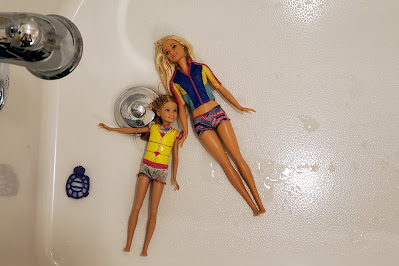Knowing What Not to Say
"Do we have to pay for water?" my daughter asked last week as she played with Dolphin Magic Barbie and Jet Ski Stacie in the bath.
She's 7, and still discovering the where's and why's of how things work in our household. Recently we'd told her not to leave the garden hose running, because it wastes both water and money.
I explained that yes, we pay a utility company to send clean water through our pipes and into the tubs, faucets, and hoses.
"If you ever need money to pay for water, you can take some of my money," she offered.
As I looked into the face of this sweet girl I'm raising, I was moved by her open-hearted generosity, unselfishness, and willingness to help. And I knew exactly what not to say.
 |
| Barbie's Bathtub Adventures |
Growing up, my family frequently struggled to pay the bills. I remember around age 8 repeating to my Girl Scouts leader that we had an "outstanding Visa bill" even though I had no idea what that meant. At age 9 we spent a week in winter without electricity, sleeping in front of our glowing fireplace and heating water on a camp stove. At 10 I told a friend that I wasn't sure if we would have electricity when she came over to spend the night, as though this was something most fifth-graders dealt with regularly.
My mom believed that children shouldn't be talked down to, but treated more like tiny adults. The positive result was I had an impressive vocabulary. The negative result was being starkly aware of my family's financial troubles. Of course, even if she wanted to my mother couldn't have hidden the fact that the lights didn't turn on when I flipped a switch.
A vivid memory: I am standing in the dining room of a house we eventually lost to foreclosure. Light is pouring in through the windows and my mom is sitting at the table, the spiral notebook where she wrote her to-do lists spread out before her. I don't remember what bill my mother was grappling with at the time, only that I told her, "If we need money, you can sell my Barbies."
I owned maybe half a dozen Barbie dolls (and one Ken) that were some of my most prized possessions. Some were gifts, some were purchased during less difficult times, but none were valuable - just well-loved toys with frizzy hair and missing accessories. I spent many otherwise boring days on our rural dead-end street living exciting lives through my Barbies, and I certainly didn't want to let them go. I was offering up my whole child heart.
I don't remember any hesitation before my mom replied, "That will be our ace in the hole."
My tender heart thudded with hurt and fear. Would my mom really take my Barbies and sell them? What does "ace in the hole" mean? Was it too late to take it back, tell her I was just trying to be helpful and didn't really mean it?
I pictured laying my beloved Day to Night Barbie, Angel Face Barbie, Tropical Skipper, and Tropical Ken into an open cardboard box and handing them over to another little girl, a girl who was no doubt more deserving than I was, and whose family had more money than mine.
I probably cried.
 |
| Her eyeshadow was long gone. |
My mother never sold my Barbies to pay the bills, but the damage was done. I couldn't understand why she'd be so willing to do something so hurtful to me - unable, at such a young age, to grasp the bigger picture of shared sacrifice. And I was weighed down by the knowledge that my family was in such dire straits that they'd take from me. I felt that none of my things were safe, and maybe neither was I.
I don't know my mother's rationale for saying what she did that sunny day. Maybe she sincerely thought about selling my toys as a last resort, or maybe she was merely trying to recognize my generosity and fumbled her expression. If I could ask her, there's no guarantee she'd even remember the exchange. But that moment of panic and worry has stuck with me, trapped in the quiet folds of my memory for decades.
Somewhere nearby in my brain is my resolve to not make the same mistakes that my parents did.
So when my second-grader offered her savings from birthdays, chores, and good report cards, I told her what my mother should have told me:
"Thank you very much for offering, sweetheart. But it's not your job to help pay the bills for our family. You keep your money."
Somewhere a little girl, still soft and trusting, skipped off to play with her Barbies.

I believe marriage counseling is one of the most effective ways to feel better and heal from past relationship struggles. A trusted marriage counselor in cincinnati helps couples who have unresolved emotional issues that disrupt their daily lives. Couples who want to rebuild their emotional connection need to address their past experiences through a organized safe space which provides them support. It brings comfort to know that certified counselors can transform distressing situations into pathways for personal development and restored relationships.
ReplyDelete